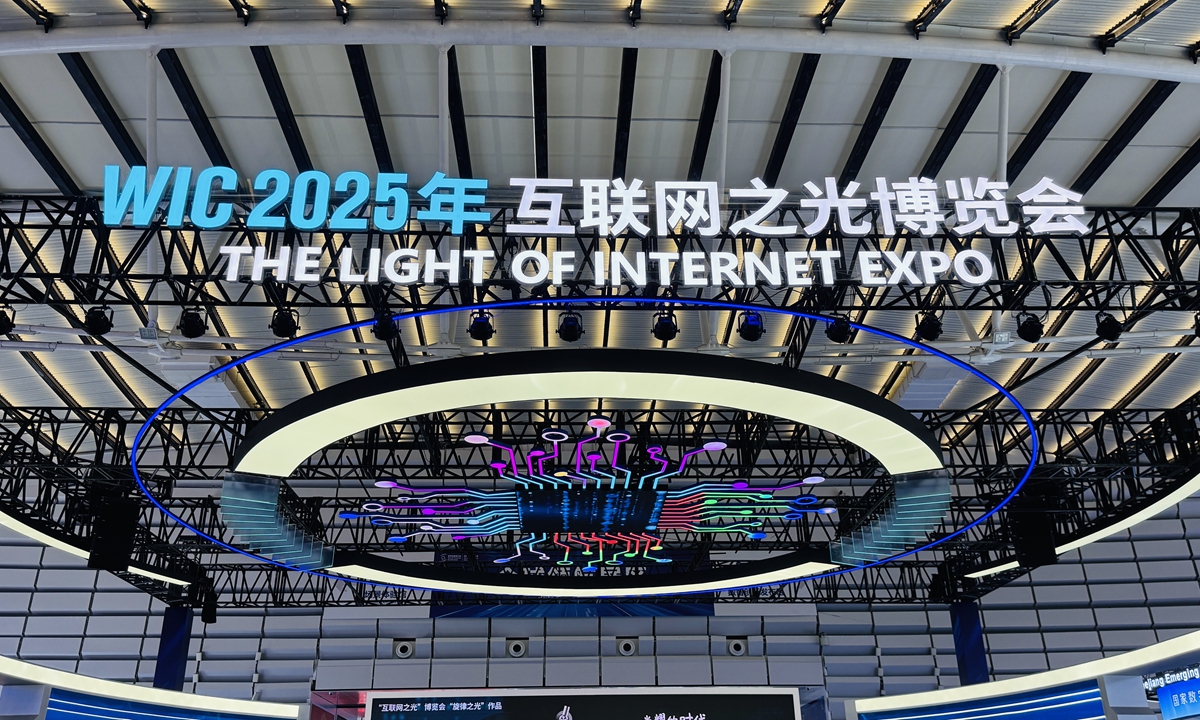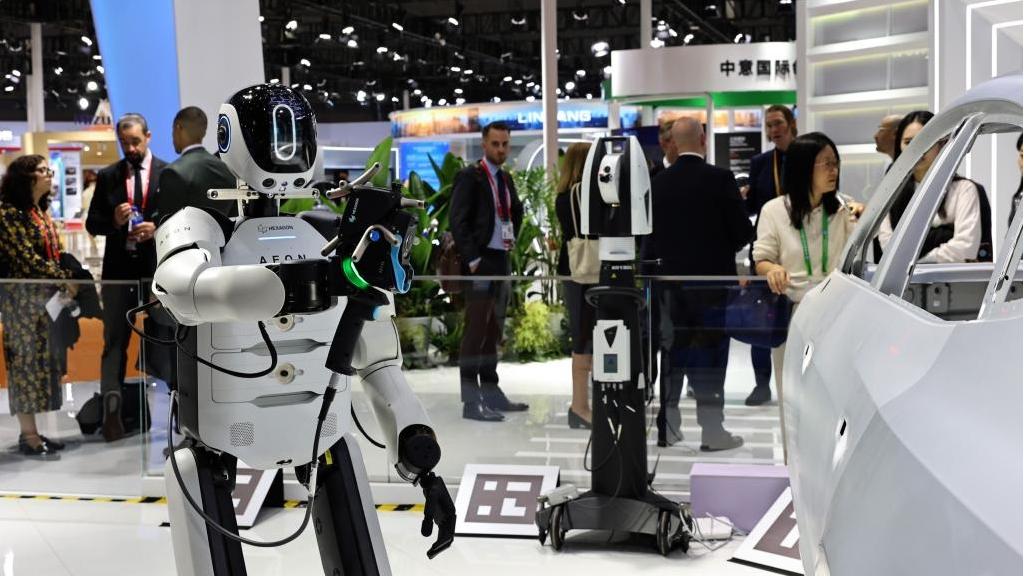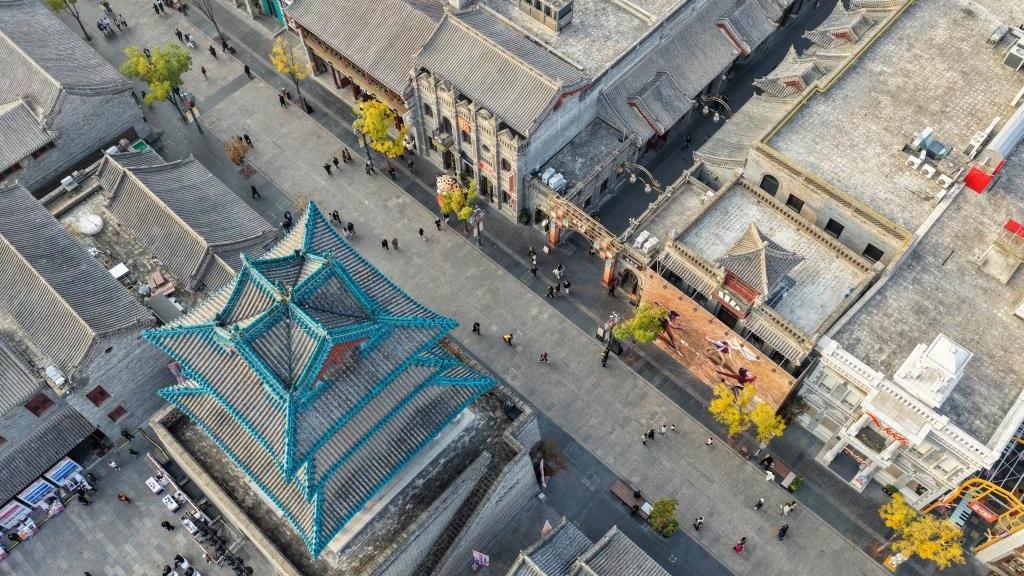World Internet Conference Wuzhen Summit boosts ancient town's transformation into a smart hub, sharing dividends with the world

A view of the Light of Internet Expo of the 2025 World Internet Conference Wuzhen Summit in Wuzhen, East China's Zhejiang Province, on November 8, 2025 Photo: Chi Jingyi/GT
The 2025 World Internet Conference (WIC) Wuzhen Summit, which concluded on Sunday in Wuzhen, East China's Zhejiang Province, stands as a landmark event for China's internet industry, serving as a microcosm of the nation's rapid digital evolution.
This year, the summit celebrated its 12th session as well as the 10th anniversary of the concept of building a community with a shared future in cyberspace.
Over the past decade, China has driven global information infrastructure development, helping countries share the dividends of the digital age by contributing Chinese solutions and wisdom in addressing cyberspace challenges and sharing development opportunities, WIC participants said.
Wuzhen, a 1,300-year-old town on the water, became the permanent host of the WIC in 2014. The development of the internet has made time flow in two distinct rhythms in the town: the "slow version," with white walls, dark grey tiles, and oar boats gliding on waterways; and the "fast version," with data streams and interconnected systems, weaving past and future in harmony.
Technological advancements
Distances once crossed by oar boats are now spanned instantly by 5G signals; local specialties once sold at bridgehead markets now sail overseas via e-commerce; futures once imagined are now reality, empowered by artificial intelligence (AI), which was one of the focuses of the 2025 WIC.
Chinese enterprises showcased embodied intelligence and other cutting-edge technologies at the WIC, offering glimpses into AI's next decade.
"In the past two years, numerous domestic companies focusing on humanoid robots and embodied intelligence have emerged - mostly young firms established within one to three years. This surge stems from strong national support on one hand and, on the other, from technological development reaching a critical inflection point," Zhang Chengcheng, senior business manager at Chinese robotics startup Noetix Robotics, told the Global Times on Saturday on the sidelines of the summit.
The company brought its bionic humanoid robot Xiaonuo to the Light of Internet Expo, one of the signature events of the Wuzhen summit.
"The industry designates the year 2025 as the inaugural year for the commercial application of humanoid robots," said Zhang.
According to statistics from the summit organizer, 17 international projects winning the 2025 Awards for Pioneering Science and Technology of the WIC were predominantly in AI, spanning foundational chips and operating systems to large models, and from front-end AI agents to applications.
The winning projects included Alibaba's open-source, foundational large language model Qwen and the key technologies and applications of China's BDS-3 (BeiDou Navigation Satellite System) satellite-navigation signals, according to Xinhua News Agency.
"I'm seeing a lot of innovation and practical solutions aiming to solve global challenges in this conference," Frédéric Werner, chief of strategic engagement at International Telecommunication Union and co-creator of the United Nations AI for Good Global Summit, told the Global Times on the sidelines of the WIC Wuzhen Summit.
"In the past, AI advancements could be tracked year by year, but now they unfold week by week. This rapid pace brings immense opportunities to create value, launch new businesses, foster collaborations, and develop solutions to global challenges," Werner said.
Sharing dividend
Beyond technology, the Wuzhen Summit provides global enterprises with the opportunities to share in global internet technology advancements and governance. As digital waves sweep the globe, cyberspace becomes humanity's shared activity space, WIC participants noted.
In December 2015, the concept of building a community with a shared future in cyberspace was proposed at the second WIC. Over 10 years, Wuzhen has seen this vision evolve from a concept to practice, from blueprint to solutions, effectively bridging the digital divide.
A representative from leading domestic cybersecurity company DAS-Security told the Global Times on the sidelines of the WIC that as a participant and contributor to the Wuzhen Summit for 12 consecutive years, "we have witnessed the grand leap of this concept from a proposal to an international consensus."
DAS-Security won the Distinguished Contribution Award at the WIC Wuzhen Summit on Friday for breakthroughs in global internet development and governance, together with 13 other enterprises, according to the summit organizer.
"Through WIC's global platform, DAS-Security engages with partners worldwide to explore the methods for implementing the concept," the representative said.
As the concept of building a community with a shared future in cyberspace gains deeper resonance, WIC's achievements are becoming increasingly concrete and perceptible - from brainstorming to a showcase of global internet frontier innovation and a platform for sharing best practices.
Since 2021, WIC has released outstanding case studies on building a community with a shared future in cyberspace for four consecutive years, vividly demonstrating robust innovation vitality in the global internet field through practical examples and contributing wisdom and solutions to global internet development.
"I think the best thing which may happen in this conference would be networking. You can find suitable people for your purpose not only in technology field, but also in the expanding of the commercial goals," Hamed Shojaesangchouli, international business development officer at the Iran Science and Technology Park, told the Global Times on Friday.
Over the past decade, China has boosted global information infrastructure through increased funding and technical support, particularly aiding less-developed countries with technologies, equipment, and services to enhance digital connectivity and share digital-era dividends.
"AI and the internet transcend borders, making their development a shared global responsibility. We have to make great efforts to prevent the digital divide from widening, and that the Global South can benefit from all of these new technologies," Werner said.
This "bridge" of connection originating from Wuzhen now extends worldwide, making development outcomes tangible for all.
For instance, the China-sponsored Luban Workshop has delivered vocational training in digital technologies in many countries. So far, this Chinese vocational-education brand has taken root in 29 countries, offering 57 programs in 14 major fields, including AI, electric-vehicle maintenance, and civil engineering, according to Xinhua.
Photos
Related Stories
Copyright © 2025 People's Daily Online. All Rights Reserved.









